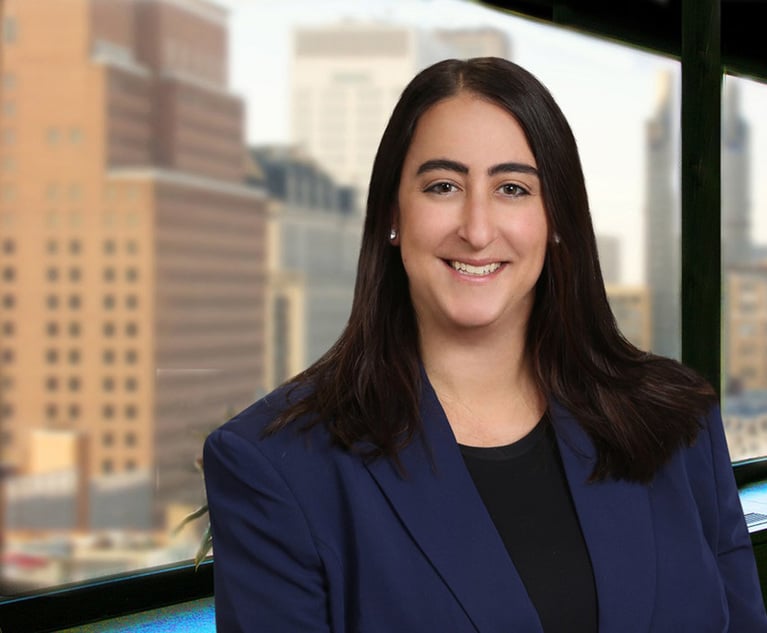New Trial Ordered in Med Mal Case Where Juror Was Insurance Carrier's Lawyer
"Without a thorough inquiry of juror number seven, the court could not properly determine whether additional voir dire was necessary to assure that impermissible tainting of the other jurors did not occur," the Appellate Division said.
September 14, 2018 at 05:55 PM
4 minute read

A New Jersey appellate court has ordered a new trial in a medical malpractice case where a juror was allowed to serve despite having previously been counsel to the defendant's insurance carrier.
An Essex County jury no-caused gynecologic oncologist Robert Taylor in a suit claiming he failed to provide informed consent to Sanghamitra Sengupta before removing her uterus, cervix, fallopian tubes and ovaries due to suspicion of cancer.
According to the Appellate Division's Sept. 14 ruling, during jury selection, after the plaintiff had exhausted all her peremptory challenges, a prospective juror stated that she was reluctant to serve because she was an attorney who represented malpractice carrier Princeton Insurance in coverage disputes. Juror No. 7 nevertheless said she could be fair despite an “allegiance” to Princeton.
Essex County Superior Court Judge Robert Gardner discounted the issue and seated the juror, even after plaintiff's counsel objected and defense counsel said that Taylor was covered by Princeton Insurance, whose website says it is “New Jersey's leading healthcare liability insurer.”
The appeals court said Gardner not only erred in failing to excuse the juror with the conflict, but in failing to investigate whether her presence tainted the rest of the jury. Gardner accepted her word that she did not have any discussions with other jurors, and failed to probe if she inadvertently imparted any other information to other jurors, Judges Marie Simonelli, Michael Haas and Greta Gooden Brown said in the unpublished per curiam decision.
After the surgery, the court said, Taylor learned that Sengupta was cancer-free but had a molar pregnancy, a rare and potentially dangerous condition in which an egg with no genetic information is fertilized by sperm but does not develop into a fetus, instead continuing to grow as a lump of abnormal tissue.
The molar pregnancy was confirmed by a pap smear and tissue specimen retrieved from Sengupta and sent to the lab before the surgery. But the results were not received until after the surgery because Taylor did not request them on a rush basis, according to the decision. Although Sengupta signed an informed consent form authorizing the surgical procedure, she claimed Taylor did not inform her that she had the option of putting off surgery until she received the lab results that told her she was pregnant.
Throughout the trial, a representative of Princeton Insurance was seated in the courtroom, the court noted. On the first day of trial, Sengupta's lawyer noted the Princeton Insurance representative's presence in the courtroom during a sidebar colloquy, and later he noted on the record that Juror No. 7 appeared to recognize the Princeton representative. The plaintiff's counsel again objected to the seating of the juror, and defense counsel had no objection to the removal of the juror, but the judge declined to entertain the issue and indicated he would object to that juror serving as an alternate, according to the decision.
On the third day of trial, Juror No. 7 sent the judge a note saying she recognized the Princeton representative. Sengupta's lawyer, Michael Mangan, moved for a mistrial, but Gardner denied it.
After the no-cause verdict, Mangan moved for a new trial, but Gardner denied that motion, too.
On appeal, Mangan contended that the court's refusal to remove the juror deprived his client of the right to an impartial, unprejudiced jury.
The appeals court agreed.
Because securing an impartial jury goes to the essence of a fair trial, the court has “an independent duty to act swiftly and decisively to overcome” potential bias, the Appellate Division said.
Mangan, of Mangan Ginsberg in New York, said of the ruling, “I'm impressed by the Appellate Division's handling of this. This was a civil jury trial—most cases about an unfair jury selection process are in the criminal realm. [The court] made clear that a fair jury trial requires a fair jury selection in the civil context.”
Christine Jones of Farkas & Donohue in Florham Park, who represented the defendant doctor, did not respond to a call about the case.
This content has been archived. It is available through our partners, LexisNexis® and Bloomberg Law.
To view this content, please continue to their sites.
Not a Lexis Subscriber?
Subscribe Now
Not a Bloomberg Law Subscriber?
Subscribe Now
NOT FOR REPRINT
© 2025 ALM Global, LLC, All Rights Reserved. Request academic re-use from www.copyright.com. All other uses, submit a request to [email protected]. For more information visit Asset & Logo Licensing.
You Might Like
View All

NJ Firm Narrowly Avoids Case Dismissal Over Lengthy Complaint Filed in Fed Court
4 minute read
On the Move and After Hours: Meyner and Landis; Cooper Levenson; Ogletree Deakins; Saiber
3 minute read
AstraZeneca Files Flurry of Lawsuits to Protect Cancer Treatment Drug
3 minute readTrending Stories
- 1‘Facebook’s Descent Into Toxic Masculinity’ Prompts Stanford Professor to Drop Meta as Client
- 2Pa. Superior Court: Sorority's Interview Notes Not Shielded From Discovery in Lawsuit Over Student's Death
- 3Kraken’s Chief Legal Officer Exits, Eyes Role in Trump Administration
- 4DOT Nominee Duffy Pledges Safety, Faster Infrastructure Spending in Confirmation Hearing
- 5'Younger and Invigorated Bench': Biden's Legacy in New Jersey Federal Court
Who Got The Work
J. Brugh Lower of Gibbons has entered an appearance for industrial equipment supplier Devco Corporation in a pending trademark infringement lawsuit. The suit, accusing the defendant of selling knock-off Graco products, was filed Dec. 18 in New Jersey District Court by Rivkin Radler on behalf of Graco Inc. and Graco Minnesota. The case, assigned to U.S. District Judge Zahid N. Quraishi, is 3:24-cv-11294, Graco Inc. et al v. Devco Corporation.
Who Got The Work
Rebecca Maller-Stein and Kent A. Yalowitz of Arnold & Porter Kaye Scholer have entered their appearances for Hanaco Venture Capital and its executives, Lior Prosor and David Frankel, in a pending securities lawsuit. The action, filed on Dec. 24 in New York Southern District Court by Zell, Aron & Co. on behalf of Goldeneye Advisors, accuses the defendants of negligently and fraudulently managing the plaintiff's $1 million investment. The case, assigned to U.S. District Judge Vernon S. Broderick, is 1:24-cv-09918, Goldeneye Advisors, LLC v. Hanaco Venture Capital, Ltd. et al.
Who Got The Work
Attorneys from A&O Shearman has stepped in as defense counsel for Toronto-Dominion Bank and other defendants in a pending securities class action. The suit, filed Dec. 11 in New York Southern District Court by Bleichmar Fonti & Auld, accuses the defendants of concealing the bank's 'pervasive' deficiencies in regards to its compliance with the Bank Secrecy Act and the quality of its anti-money laundering controls. The case, assigned to U.S. District Judge Arun Subramanian, is 1:24-cv-09445, Gonzalez v. The Toronto-Dominion Bank et al.
Who Got The Work
Crown Castle International, a Pennsylvania company providing shared communications infrastructure, has turned to Luke D. Wolf of Gordon Rees Scully Mansukhani to fend off a pending breach-of-contract lawsuit. The court action, filed Nov. 25 in Michigan Eastern District Court by Hooper Hathaway PC on behalf of The Town Residences LLC, accuses Crown Castle of failing to transfer approximately $30,000 in utility payments from T-Mobile in breach of a roof-top lease and assignment agreement. The case, assigned to U.S. District Judge Susan K. Declercq, is 2:24-cv-13131, The Town Residences LLC v. T-Mobile US, Inc. et al.
Who Got The Work
Wilfred P. Coronato and Daniel M. Schwartz of McCarter & English have stepped in as defense counsel to Electrolux Home Products Inc. in a pending product liability lawsuit. The court action, filed Nov. 26 in New York Eastern District Court by Poulos Lopiccolo PC and Nagel Rice LLP on behalf of David Stern, alleges that the defendant's refrigerators’ drawers and shelving repeatedly break and fall apart within months after purchase. The case, assigned to U.S. District Judge Joan M. Azrack, is 2:24-cv-08204, Stern v. Electrolux Home Products, Inc.
Featured Firms
Law Offices of Gary Martin Hays & Associates, P.C.
(470) 294-1674
Law Offices of Mark E. Salomone
(857) 444-6468
Smith & Hassler
(713) 739-1250






